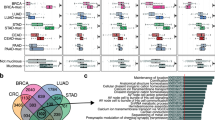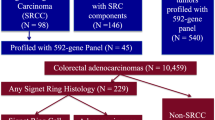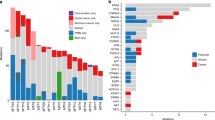Abstract
Mucinous carcinomas are defined on the basis of the amount of the mucus component in the tumour mass. Apart from this quantitative criterion, a number of clinicopathological parameters (such as localisation, prevalence in different countries and age groups, association with HNPCC and inflammatory processes) and genetic alterations (e.g. frequency of mutation in Ki-ras and p53 genes, level of MUC2 expression) differentiate these tumours from the non-mucinous ones. Since a different set of genetic lesions implies different inducing agents, these observations suggest that there may be a 'mucinous pathway of carcinogenesis'. Further identification of genetic changes characteristic of the mucinous phenotype will help to understand the aetiology of these tumours and possibly establish markers for detection of the high-risk group.
This is a preview of subscription content, access via your institution
Access options
Subscribe to this journal
Receive 24 print issues and online access
$259.00 per year
only $10.79 per issue
Buy this article
- Purchase on Springer Link
- Instant access to full article PDF
Prices may be subject to local taxes which are calculated during checkout
Similar content being viewed by others
Author information
Authors and Affiliations
Rights and permissions
About this article
Cite this article
Hanski, C. Is mucinous carcinoma of the colorectum a distinct genetic entity?. Br J Cancer 72, 1350–1356 (1995). https://doi.org/10.1038/bjc.1995.514
Issue Date:
DOI: https://doi.org/10.1038/bjc.1995.514
This article is cited by
-
Long-term effect of neoadjuvant radiotherapy in patients with locally advanced rectal mucinous adenocarcinoma: a population-based study of 1514 patients
Scientific Reports (2023)
-
Mucinous colorectal adenocarcinoma: clinical pathology and treatment options
Cancer Communications (2019)
-
Associations of single nucleotide polymorphisms with mucinous colorectal cancer: genome-wide common variant and gene-based rare variant analyses
Biomarker Research (2018)
-
Advances in the care of patients with mucinous colorectal cancer
Nature Reviews Clinical Oncology (2016)
-
Implication of K-ras and p53 in colorectal cancer carcinogenesis in Tunisian population cohort
Tumor Biology (2014)



